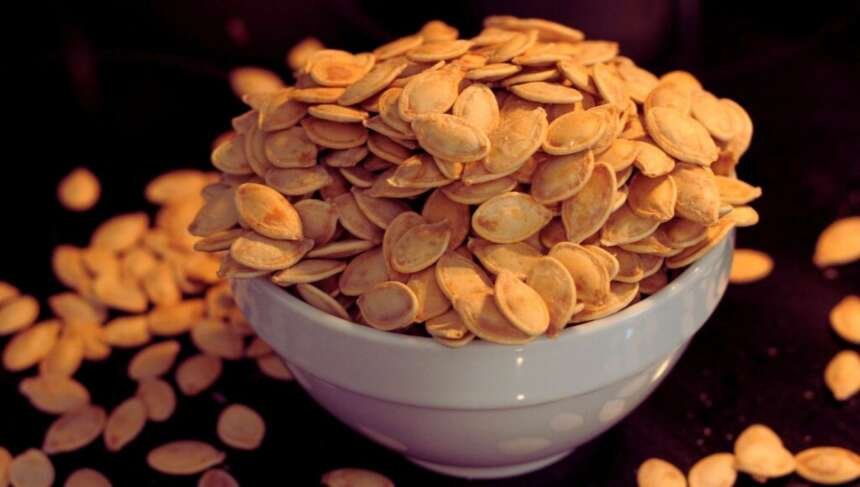Diabetes is a chronic metabolic disorder that affects millions of people worldwide. While there is no cure for diabetes, managing the condition through a balanced diet and lifestyle is very important.
One food item that has gained attention for its potential benefits in diabetes management is pumpkin seeds.
In this article, we will explore whether eating pumpkin seeds is beneficial for diabetes patients, backed by recent research studies and scientific evidence.
What are Pumpkin Seeds?
Pumpkin seeds, also known as pepitas, are the edible seeds found inside pumpkins. These flat, oval-shaped seeds have a green or cream-colored outer shell and a nutty flavor.
Pumpkin seeds are a nutritional powerhouse, packed with essential vitamins, minerals, antioxidants, and beneficial plant compounds.
Nutritional Profile of Pumpkin Seeds
| Nutrient | Amount per 100g |
|---|---|
| Calories | 559 |
| Protein | 30.23g |
| Fat | 49.05g |
| Saturated Fat | 8.67g |
| Monounsaturated Fat | 16.04g |
| Polyunsaturated Fat | 23.29g |
| Carbohydrates | 10.71g |
| Fiber | 6g |
| Sugars | 0.33g |
| Calcium | 46mg |
| Iron | 8.82mg |
| Magnesium | 592mg |
| Phosphorus | 1233mg |
| Potassium | 809mg |
| Sodium | 18mg |
| Zinc | 7.64mg |
| Copper | 1.352mg |
| Manganese | 4.543mg |
| Selenium | 9.4μg |
| Vitamin A | 16μg |
| Vitamin C | 0.8mg |
| Vitamin E | 2.18mg |
| Vitamin K | 7.3μg |
| Thiamin (B1) | 0.273mg |
| Riboflavin (B2) | 0.153mg |
| Niacin (B3) | 1.656mg |
| Vitamin B6 | 0.143mg |
| Folate (B9) | 58μg |
| Pantothenic Acid (B5) | 0.75mg |
Pumpkin seeds are an excellent source of various nutrients that can contribute to better diabetes management. Here’s a breakdown of some of the key nutrients found in pumpkin seeds:
- Fiber: Pumpkin seeds are rich in dietary fiber, which can help slow down the absorption of glucose into the bloodstream, improving blood sugar control.
- Magnesium: These seeds are a good source of magnesium, a mineral that plays a crucial role in regulating blood sugar levels and improving insulin sensitivity.
- Zinc: Pumpkin seeds contain a significant amount of zinc, which is essential for the proper functioning of insulin and the metabolism of glucose.
- Antioxidants: Pumpkin seeds are rich in antioxidants like vitamin E and carotenoids, which can help protect the body against oxidative stress, a condition associated with diabetes complications.
- Healthy Fats: Pumpkin seeds are a good source of healthy unsaturated fats, including omega-3 and omega-6 fatty acids, which can improve insulin sensitivity and reduce inflammation.
Benefits of Pumpkin Seeds for Diabetes Patients
Several research studies have explored the potential benefits of consuming pumpkin seeds for individuals with diabetes. Here are some of the key findings:
- Blood Sugar Control: A study published in the Journal of Medicinal Food in 2011 found that consuming pumpkin seeds improved blood sugar control and reduced the risk of diabetes complications in individuals with type 2 diabetes.
- Improved Insulin Sensitivity: Many study suggested that the high magnesium content in pumpkin seeds may improve insulin sensitivity and glucose metabolism. [Source]
- Reduced Oxidative Stress: The antioxidants present in pumpkin seeds, such as vitamin E and carotenoids, can help reduce oxidative stress, which is associated with insulin resistance and diabetes complications. [Source]
- Anti-inflammatory Properties: Pumpkin seeds contain compounds like phytosterols and phenolic acids, which have been shown to possess anti-inflammatory properties, potentially reducing the inflammation associated with diabetes. [Source]
- Weight Management: Pumpkin seeds are low in carbohydrates and high in fiber and protein, which can promote feelings of fullness and support weight management, an essential aspect of diabetes control. [Source]
How You can Incorporate Pumpkin Seeds into Your Diet
If you have diabetes, incorporating pumpkin seeds into your diet can be a nutritious and delicious way to manage your condition. Here are some tips for adding pumpkin seeds to your meals:
- Snack on Roasted Pumpkin Seeds: Roasted pumpkin seeds make a great snack option. You can roast them with a little olive oil and your favorite spices for added flavor.
- Sprinkle on Salads: Add a handful of pumpkin seeds to your salads for a nutritious crunch and a boost of essential nutrients.
- Incorporate into Baked Goods: Pumpkin seeds can be added to bread, muffins, and other baked goods for added texture and nutrition.
- Make Pumpkin Seed Butter: Blend roasted pumpkin seeds into a smooth butter and use it as a spread on toast or crackers.
- Add to Trail Mixes: Combine pumpkin seeds with nuts, dried fruits, and other seeds for a nutrient-dense and portable snack option.
Moderation is Key
While pumpkin seeds offer numerous benefits for diabetes management, it’s essential to consume them in moderation. Pumpkin seeds are high in calories and fat, so overeating them can lead to weight gain, which can exacerbate diabetes complications. Additionally, individuals with nut or seed allergies should avoid consuming pumpkin seeds.
Consult with a Healthcare Professional
If you have diabetes and are considering incorporating pumpkin seeds into your diet, it’s advisable to consult with a healthcare professional or a registered dietitian. They can provide personalized guidance on the appropriate portion sizes and integration of pumpkin seeds into your overall diabetes management plan.
The Bottom Line
In conclusion, recent research studies and scientific evidence suggest that eating pumpkin seeds can be beneficial for individuals with diabetes.
These nutrient-dense seeds can help improve blood sugar control, enhance insulin sensitivity, reduce oxidative stress, and provide anti-inflammatory properties.
However, it’s crucial to consume pumpkin seeds in moderation and as part of a balanced diet under the guidance of a healthcare professional. By incorporating pumpkin seeds into your diet, you can potentially enhance your diabetes management and overall health.








